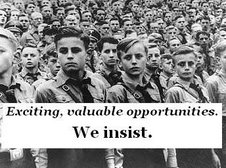I'm just catching up on my Economist reading and came across this* one from a couple of weeks ago. French broadcasting unions are striking because they want to maintain advertising on the public broadcasting service:
THAT France's unions led a one-day broadcasting strike last week was scarcely a surprise. The French have grown used to non-stop piped music on the public airwaves during walk-outs. But the cause of the disgruntlement was unusual. The plan the left-leaning unions object to does not call for the privatisation of public television, but the abolition of advertising on state-owned channels. The unions are, in short, fighting to remain dependent on private-sector advertisers. Without them, they fear, jobs will have to go.
So here we have a wonderful example of the left not knowing which way to turn. In the UK if anyone mentions ads on the beeb they are Philistines at best and fascists at worst. Could you imaging the beeb's unions' attitude to adverts - apoplectic rage followed by histrionics followed by petulant claims that it would reduce quality of television.
The article deals with this last argument as well.
Mr Sarkozy seems to think that ending advertising will improve matters. “Public television must be ‘dangerous’ and audacious. It must take risks,” he said, arguing that the way to ensure this is to free it from the need to sell eyeballs to advertisers. But there are three objections to his plan.
OK, I can see that argument and its the one that the beeb's supporters use as well. But does it really happen like that?
First, experience in other countries shows that there is no automatic link between public finance and higher quality. The French seem to consider Britain's BBC, which has no advertising on its domestic service, as a model. Yet the most popular programme on the main BBC channel last year was a soap opera, and its prime-time schedule is packed with reality TV and talent contests.
That's not very helpful to their argument is it? So why is that then?
The reason is simple: if, as with the BBC, public television is financed largely by a licence fee or TV tax, it must still chase ratings in order to justify levying the tax. Since France also levies a licence fee, which provides 64% of the public-television budget, state broadcasters—with or without advertising—will be compelled to lure big audiences, and are likely to do so with low-brow, popular shows.
The rest of the article goes on to discuss how Sarkozy plans to replace advertising revenues:
Third, Mr Sarkozy has promised public broadcasters that he will replace every euro of lost ad revenue with public money. Exactly how is unclear, but he has said that, as well as taxing the extra ad revenues won by the private channels, he may introduce an “infinitesimal” tax on mobile phones and Internet access. Politically, this may be appealing, but economically it would be a mistake. Given the sluggish state of the economy and the relative lack of high-tech investment, a tax on all things digital would be daft. As one French boss puts it: “It would be shooting the French economy in the foot.”
For my part I blow hot and cold with the beeb. When it is good its very good, and when it bad it horrid. I wouldn't object to some PSB but its probably too big now. Its stepping on to areas that are being filled by private broadcaster and distorting markets. Perhaps a reduction in size, back to say 1, or 2 at most, TV channels and 2 national radio licences. It probably doesn't need to be in local TV and radio either. If the BBC does develop popular programmes like Eastenders or formats it should be made to sell them to the highest bidder and/or make get some licence fee for each new series to bolster it revenues.
That's probably enough for now, I'm sure I'll return to this subject in the future.
*I think you need a subcription to be able to read the article.











No comments:
Post a Comment